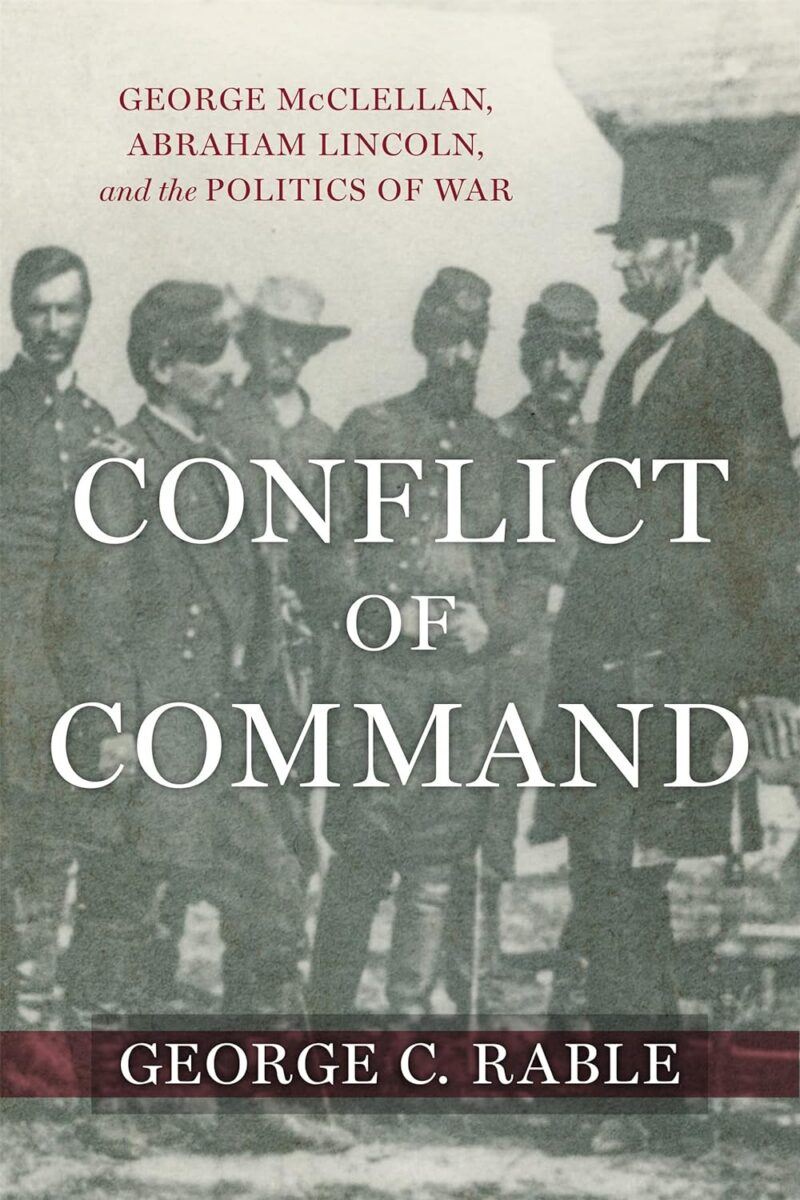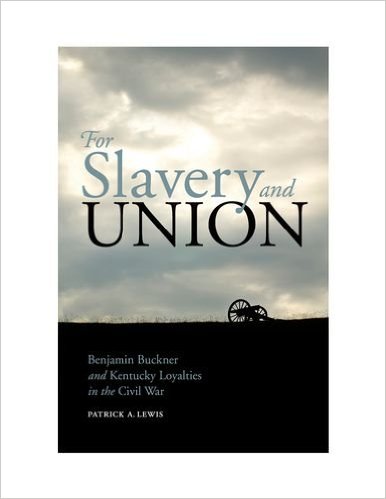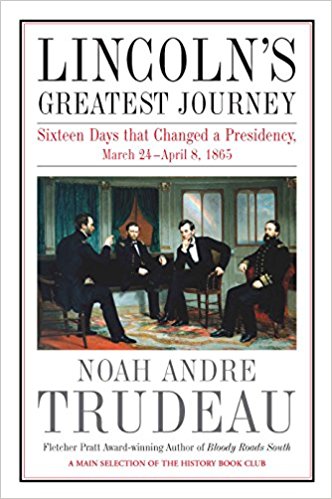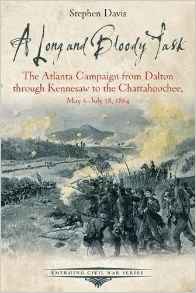Today, we are often harangued by breathless pants that our society has never been more divided. If only our politics could return to once idyllic days of courteous decorum. Such blinkered assessments would have come as a surprise to that generation of Americans who fought a civil war. In a nation riddled by chaos—festooned by the weight of democracy’s literal demise—Americans during the 1860s confronted political disfunction on an enormous scale. The crisis extended well beyond the eleven insurrectionary states whose brazen Confederate government defied the constitutional order. Loyal citizens themselves divided among bitter political factions. Abraham Lincoln’s Republican Party and even the president’s own cabinet splintered into wily offshoots. And the Army of the Potomac, the nation’s great hope for reunion, consumed itself in nasty political bouts centered on its dashing commander, Maj. Gen. George B. McClellan.
Herein lies the context for George C. Rable’s brilliant and fast-paced, absorbing and all too cautionary Conflict of Command. Do we really need another book on the storied rivalry between commander-in-chief Lincoln and his stubborn general McClellan? Have we not agreed that Lincoln triumphed over McClellan’s obstinate foiling of the president’s otherwise visionary wartime strategy? The familiar tale of their relationship goes something like this: Lincoln tried in vain to find a general who would wage the war for Union in a way that the president surely knew that it should be fought. The magnanimous president gave McClellan every opportunity to implement this strategy, but at every turn the ungrateful, backbiting general stymied his civilian superior. In November 1862, with victory in doubt, Lincoln had little choice but to relieve the beleaguered officer from command, opening the way to more competent leadership on the road to Union victory. For generations, incredulous arm-chair critics and even learned scholars have wondered, “why did not Lincoln fire McClellan sooner?”
Rable finds in this conventional wisdom a false premise that obscures more than it illuminates. He probes a far more complex puzzle: why did Lincoln tolerate—and sometimes even defend!—McClellan for so long? The answer resides in Rable’s organizing theme. If the Civil War contested the nature of American democracy, then it was “impossible to separate army politics from civilian politics” (280). As Rable sees it, McClellan was hardly a halfwit and Lincoln was hardly a military oracle. Though in their own ways brilliant and shortsighted, both the president and the soldier yielded to the force of politics characteristic of a democracy at war.
Lincoln and McClellan anchored disparate positions on the political spectrum. The antislavery Lincoln came increasingly to see that the Union of old could not be restored to its prewar image. Though a Republican, he also catered to the interests of his diverse national constituency, advertising moderate, gradual, compensatory policies of emancipation. A stalwart Democrat from a prominent political family, McClellan was a West Point officer who loathed civilian authorities. Bumbling and incompetent politicians, he believed, could only blunder the nation into greater turmoil, especially if they promoted a social revolution. The national crisis must be resolved by dispassionate military professionals whose scientific acumen rose above the din of political passion. Who was correct: the statesman or the general? Rable compels us to see that, when taken on their own terms, both Lincoln and McClellan were right. And thus, each man found himself in a political firestorm, partly of their own making but partly due to an environment beyond their control.
It is commonplace to regard Lincoln and McClellan as men who could not be more different. Lincoln, the unpretentious prairie lawyer who spun off-color yarns, looked nothing like his effete, brash, snobby general. But we should not be in haste to reduce their contentious relationship to incongruent upbringings and personality differences. Indeed, each man’s similarities boiled their cauldron of distrustful miscommunication. Both were as ambitious, patriotic, and shrewd as they were diffident, uncertain, and oblivious. Both men were confident in their abilities but often prone to inaction. While McClellan “struggled all his life with authority figures,” Lincoln wielded his authority as commander-in-chief with guarded and sometimes clumsy wariness.
That is why Rable wants little to do with the standard narrative of Lincoln and McClellan’s fraught relationship. Theirs was a bond conceived in and strained by politics. It could be no other way in the rambunctious realm of nineteenth-century American democracy. The goal of preserving the Union meant little if politics could not negotiate the partisan divide. From the disastrous aftermath of First Bull Run to the drama along the Virginia Peninsula, and from the rise and fall of John Pope to the climax at Antietam, “military policy had become a partisan issue, as had the whole question of command.” Because of the president’s limited grasp of military affairs, Lincoln often gave McClellan a long leash. But when the general defied administration policy or expectations, Lincoln badgered the professional officer. The more radical elements of the Republican Party then fumed at McClellan’s ambivalence, nay even his alleged disloyalty. They blasted stemwinders on the floor of Congress and derided the general in the newspapers. McClellan’s fierce defenders in the press and Democratic Party then rumbled into action, accusing Secretary of War Edwin M. Stanton of hatching conspiracies against their hero, and echoing McClellan’s private insults of Lincoln as a doddering fool.
In the end, McClellan’s fate was sealed largely because of the Lincoln administration’s need to preserve itself from political disaster. While it is true that McClellan suffered from what Lincoln called “the slows,” his brand of war accorded with the Democrats’ pledge for some kind of meditated peace with the rebels. This appealed to a large swath of the loyal electorate, no less than a significant slice of McClellan’s devotees in the Army of the Potomac. As the old narratives suggest, Lincoln indeed sought a general who would fight. But Rable reminds us that Lincoln rather sought a general who would fight as a Republican.
Where does Rable stand in the age-old debate between Lincoln versus McClellan? We do not know. And that is well. His exemplary, dispassionate presentation of evidence allows historical contemporaries to tell their own story. Rable does not choose sides amid the petty bickering. His deft example reminds us that self-government is the messy though essential business of liberty. A free society will produce feisty characters, bitter debates, rancorous hand-wringing, and self-righteous personalities. Democracy impels us to find our better angels, to forge principled consensus, to restrain our partisan impulses for the greater good. Today, we would do well to abide that lesson—in our politics no less than in our writing of history.
Andrew F. Lang is associate professor of history at Mississippi State University. A recipient of the Society of Civil War Historians’ Tom Watson Brown Book Award and a finalist for the Gilder Lehrman Lincoln Prize, he is now a writing book on the relationship between Abraham Lincoln and Ulysses S. Grant.






“Rable does not choose sides…” Sounds wishy-washy. I prefer my historians to present both sides of an argument and then give us the benefit of their own view. Otherwise, their books are just another “on the one hand this and on the other hand that” form of mediocrity.